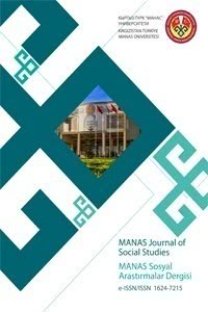SPOR LİSESİ ÖĞRENCİLERİNİN GİRİŞİMCİLİK YETERLİLİKLERİNİN İNCELENMESİ
INVESTIGATION OF ENTREPRENEURSHIP QUALIFICATIONS OF SPORTS HIGH SCHOOL STUDENTS
___
Aksoy, C., & Yalçınsoy, A. (2017). Üniversite Öğrencilerinin Girişimcilik Eğilimleri Üzerine Bir Araştırma - A Research on Entrepreneurial Tendencies of University Students. Journal of Business Research - Turk, 9(4), 341–359.Alemdağ, C., Alemdağ, S., & Özkara, A. B. (2018). The Analysis of Sports High School Students’ Learning Styles in Terms of Overall Academic Success. TED Eğitim ve Bilim, 43(194), 269-278. https://doi.org/10.15390/EB.2018.7327
Andrew, D., Pedersen, P., & McEvoy, C. (2011). Research Methods and Design in Sport Management. London: Human Kinetics.
Ardahaee, A. G., Noubatht, R., & Rostami, N. (2017). Youth Retention İn Rural Areas, A Prerequisite For Sustainable Rural Entrepreneurship And Emploument. Rural Development Strategies, 4(2), 265–279.
Ardichvili, A., Cardozo, R., & Ray, S. (2003). A Theory Of Entrepreneurial Opportunity İdentification And Development. Journal of Business Venturing, 18(1), 105–123.
Ataseven, Ö. (2016). Türkiye ve Avrupa Birliği Ülkelerindeki İlkokul Öğrencilerinin Girişimcilik Yeterliliklerinin Karşılaştırılması. Düzce Üniversitesi.
Bandura, A. (1986). Social Foundations Of Thought And Action: A Social Cognitive Theory. Prentice-Hall, Inc.
Bandura, A. (1993). Perceived Self-Efficacy İn Cognitive Development And Functioning. Educational Psychologist, 28(2), 117–148.
Bandura, A., Barbaranelli, C., Caprara, G. V., & Pastorelli, C. (1996). Multifaceted Impact of Self-Efficacy Beliefs on Academic Functioning. Child Development, 67(3), 1206–1213.
Demir, A. Z., Eliöz, M., Çebi, M., & Sezen, S. (2015). Girişimcilik ve Girişimci Üniversite: Spor Fakültesi Öğrencileri Üzerine Bir Çalışma. Ondokuz Mayıs Üniversitesi Eğitim Fakültesi Dergisi, 34(1), 198–203.
Dutta, D. K., Li, J., & Merenda, M. (2011). Fostering Entrepreneurship: İmpact Of Specialization And Diversity İn Education. International Entrepreneurship and Management Journal, 7(2), 163–179.
Ekiz, D. (2009). Bilimsel Araştırma Yöntemleri (2nd ed). Ankara: Anı Yayıncılık.
Frankfort-Nachmias, C., & Nachmias, D. (1996). Research Methods İn The Social Sciences. New York: St. Martin’s Press.
Geri, S. (2013). Research on Entrepreneurial Characteristics of Students in School of Physical Education and Sports. Turkish Journal of Education, 2(3), 50–61.
Gokhan, İ., & Toktaş, S. (2013). The Impact of Football Basic Training on Some of Motoric and Skills Parameters in Children Between 14-18 Years Old. Online International Interdisciplinary Research Journal, 3 (6), 440-447.
Jones, C., & Matlay, H. (2011). Understanding the Heterogeneity Of Entrepreneurship Education: Going Beyond Gartner. Education + Training, 53(8/9), 692–703.
Katz, J. A. (2003). The Chronology And İntellectual Trajectory Of American Entrepreneurship Education. Journal of Business Venturing, 18(1), 283–300.
Koca, C. (2006). Beden Eğı̇ tı̇ mı̇ ve SporAlaninda Toplumsal Cı̇ nsı̇ yet İlı̇ şkı̇ lerı̇Spor. Bilimleri Dergisi, 17(2), 81–99.
Mars, M. M., & Rios-Aguilar, C. (2010). Academic Entrepreneurship (Re)Defined: Significance And İmplications For The Scholarship Of Higher Education. Higher Education, 59(4), 441–460.
McGee, J. E., Peterson, M., Mueller, S. L., & Sequeira, J. M. (2009). Entrepreneurial Self-Efficacy: Refining the Measure. Entrepreneurship Theory and Practice, 33(4), 965–988.
Milli Eğitim Bakanlığı. Millî Eğitim Bakanlığı Spor Liseleri Yönetmeliği, Resmi Gazete (2005). Türkiye.
Milli Eğitim Bakanlığı, O. G. M. (2017). 2017-2018 Öğretim Yılında Güzel Sanatlar Liseleri ve Spor Liselerinin Sınıflarına Yeni Alınacak Öğrenci Kontenjanları. Retrieved 17, Серпень 2018, із http://ogm.meb.gov.tr/www/2017-2018-ogretim-yilinda-guzel-sanatlar-liseleri-ve-spor-liselerinin-9-siniflarina-yeni-alinacak-ogrenci-kontenjanlari/icerik/568
Otović, S., Demirović, D., Košić, K., & Vujko, A. (2017). Fostering Entrepreneurshıp At High Schools: A Case Of Rural Areas İn Vojvodına (Serbia). Original scientific paper, 64(4), 1523–1535.
Radu, N., Chirvase, A. A., Babeanu, N., Popa, O., Hastaran, F., Velykiene, B., & Begea, M. (2018). Education Management In The Fıeld Of Lıfe Scıences-Skılls Needed To Start And Develop An Innovatıve Sme. Scientific Papers Series Management, Economic Engineering in Agriculture and Rural Development, 18(2), 375–391.
Sánchez, J. C. (2013). The Impact of an Entrepreneurship Education Program on Entrepreneurial Competencies and Intention. Journal of Small Business Management, 51(3), 447–465.
Thomas, J. R., Nelson, J. K., & Silverman, S. J. (2015). Research Methods in Physical Activity, Seventh Edition (7th ed). Champing: Human Kinetics.
Tiwari, M., & Sanadya, G. (2018). Sustainable Development Through Women Entrepreneurship. Asian Journal of Home Science, 13(1), 271–274.
Türkmen, M., & İşbilir, U. (2014). Entrepreneurship Effect of Tendency of Socio-Demographic Characteristics of University Students. CBU Journal of Physical Education and Sport Sciences, 9(2), 18–28.
Uluyol, O. (2013). Öğrencilerin Girişimcilik Eğilimlerinin Belirlenmesi: Gölbaşı Meslek Yüksekokulu Örneği. Adıyaman Üniversitesi Sosyal Bilimler Enstitüsü Dergisi, 6(15), 349–372.
- ISSN: 1694-7215
- Yayın Aralığı: Yılda 4 Sayı
- Başlangıç: 2001
- Yayıncı: KIRGIZİSTAN-TÜRKİYE MANAS ÜNİVERSİTESİ
KÜRESELLEŞMENİN BİREY VE TOPLUM HAYATINA ETKİLERİ VE DİN EĞİTİMİ
Mehmet KORKMAZ, Cemil OSMANOĞLU
TÜRKİYE’DE İŞSİZLİĞİN KAYNAKLARI: BİR YAPISAL VEKTÖR HATA DÜZELTME MODELİ
SANAL GERÇEKLİK GÖZLÜĞÜNE DAYALI DİN ÖĞRETİMİNE YÖNELİK ÖĞRETMEN ADAYLARININ TUTUMU
UNDERSTANDING WHATSAPP PARENT GROUPS’ DYNAMICS: GROUP COMMUNICATION AND INFORMATION SHARING
DAYANIKLILIK ANTRENMANLARI SONUCU PLAZMA HACİM DEĞİŞİKLİKLERİ VE PERFORMANS İLİŞKİSİ
Uğur DÜNDAR, Sibel TETİK, Kerim DÜNDAR, Süleyman GÖNÜLATEŞ, Tansu YAAN
“BELLEK” VE “ZAMAN” KAVRAMLARI IŞIĞINDA MODIANO'NUN EN UZAĞINDAN UNUTUŞUN ADLI YAPITINA GENEL BAKIŞ
İLİŞKİ NİTELİĞİ VE BAĞIŞLAMANIN MUTLULUK ÜZERİNDEKİ ETKİSİ
RUH ADAM’DA ANİMAYLA AYDINLANAN YENİDEN DOĞUŞ ARKETİPİ: SELİM PUSAT’IN SONSUZ ISTIRABI
İŞGÜCÜ PİYASASINDA ENFORMEL KADIN İŞGÜCÜ: EV EKSENLİ ÇALIŞAN KADINLARA YÖNELİK BİR ARAŞTIRMA
ÖĞRETMEN ADAYLARININ YENİLENEBİLİR ENERJİ KAYNAKLARINA YÖNELİK TUTUMLARININ BELİRLENMESİ
